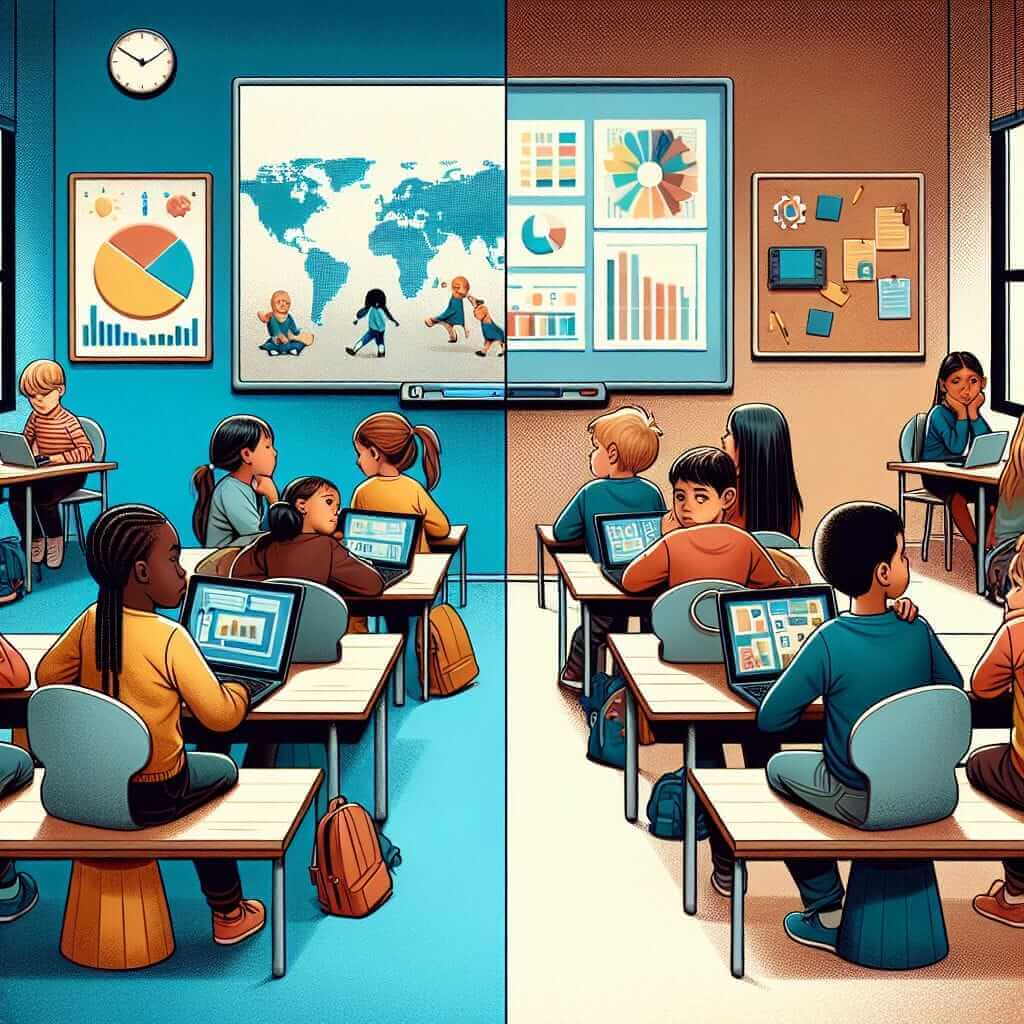“The impact of digital technology on education quality” is a frequently appearing theme in IELTS Writing Task 2. This topic allows you to delve into the multifaceted ways technology shapes the learning experience, presenting both advantages and disadvantages. Understanding this impact is crucial for IELTS preparation and for navigating the evolving landscape of education.
This article provides a comprehensive guide to crafting a high-scoring IELTS essay on this topic, complete with a sample answer, vocabulary analysis, and writing tips.
Here are some potential essay questions related to this theme:
- To what extent do you agree or disagree that digital technology has had a positive impact on the quality of education?
- Digital technology is changing the way children learn in both positive and negative ways. Discuss both views and give your own opinion.
- Some people argue that traditional teaching methods are outdated in the digital age. Do the advantages of using technology in the classroom outweigh the disadvantages?
Sample Essay Analysis: Question 1
Let’s choose the first question for our sample essay:
To what extent do you agree or disagree that digital technology has had a positive impact on the quality of education?
Analysis of the Question
This question requires you to present a clear stance on whether digital technology’s impact on education quality is largely positive. You should use relevant examples and evidence to support your position. Remember to acknowledge counter-arguments while maintaining your own perspective.
Sample Essay
Digital technology has profoundly permeated numerous aspects of modern life, and education is no exception. While some argue that its influence on education quality is unequivocally positive, I believe a balanced perspective is necessary to appreciate both its merits and potential drawbacks.
Advocates of digital technology in education highlight its ability to create engaging and personalized learning experiences. Interactive platforms, educational software, and online resources cater to individual learning styles and paces, fostering student autonomy and deeper understanding. Furthermore, technology facilitates access to a wealth of information that extends beyond traditional textbooks. Students can now explore virtual museums, access online libraries, and connect with experts around the world, enriching their knowledge base.
However, it is crucial to acknowledge the potential downsides. Over-reliance on digital devices can lead to decreased attention spans and a decline in critical thinking skills. Moreover, the digital divide, where access to technology is unequal, can exacerbate existing educational inequalities. Students without reliable internet access or personal devices may struggle to keep up with their digitally-equipped peers.

In conclusion, while digital technology offers significant potential to enhance education quality by personalizing learning and expanding access to information, it is essential to approach its integration thoughtfully. Addressing issues like digital literacy, equitable access, and the potential for distraction is crucial to harnessing its benefits while mitigating potential negative consequences. Only then can we ensure that technology serves as a true force for positive change in education.
Word count: 278 words
Writing Notes
- Structure: The essay follows a clear structure: introduction, body paragraphs presenting both sides of the argument, and a balanced conclusion.
- Vocabulary: The essay uses a range of sophisticated vocabulary related to technology and education (e.g., “permeated,” “unequivocally,” “facilitates,” “exacerbate,” “mitigating”).
- Grammar: The essay demonstrates accurate grammar usage, including complex sentence structures and appropriate use of linking words.
- Coherence and Cohesion: Ideas are logically connected using transition words and phrases, ensuring a smooth flow of information.
Key Vocabulary
- Permeate (verb) /ˈpɜː.mi.eɪt/: To spread throughout something and be present in every part of it
- Unequivocally (adverb) /ˌʌn.ɪˈkwɪv.ə.kəl.i/: In a way that is clear and leaves no doubt
- Facilitate (verb) /fəˈsɪl.ɪ.teɪt/: To make an action or process possible or easier
- Exacerbate (verb) /ɪɡˈzæs.ə.beɪt/: To make a problem, bad situation, or negative feeling worse
- Mitigate (verb) /ˈmɪt.ɪ.ɡeɪt/: To make something less harmful, unpleasant, or bad
Conclusion
Mastering the art of writing about the impact of digital technology on education quality is essential for IELTS success. By understanding the nuances of this topic, using relevant vocabulary, and constructing a well-structured essay, you can confidently express your views and achieve a high band score. Remember to practice writing essays on similar themes, incorporating the tips and vocabulary provided in this guide. For more IELTS resources, explore the links provided throughout this article.